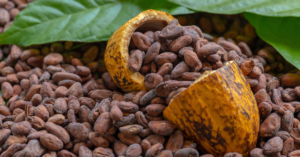
Tracing cocoa beans from the farm to the port of shipment is now a reality in Ghana with the introduction of the Ghana Cocoa Traceability System (GCTS).
The Ghana Cocoa Board (COCOBOD) initiated this system as part of its digital transformation, with its development fast-tracked to comply with the European Union Deforestation Regulation (EUDR), which takes effect in December 2024.
The EUDR, enacted in 2023, ensures that key commodities traded in Europe, such as cocoa beans, are sourced without contributing to deforestation and are free from child labour violations.
The GCTS pilot in Assin Fosu through the Cocoa Management System has over 40,000 mapped farms and more than 20,000 registered farmers, 40% of whom are women.
During the 2023/2024 lean season, over 1,230 bags (77.3 tons) of sustainable cocoa were successfully purchased, graded, and shipped via the system.
This achievement was made possible through funding from the European Union (EU) and the German Federal Ministry for Economic Cooperation and Development, alongside technical support from Deutsche Gesellschaft für Internationale Zusammenarbeit (GIZ) GmbH and COCOBOD under the EU Sustainable Cocoa Initiative Support Programme (SCISP).
During a recent monitoring and evaluation exercise, a delegation including representatives from the EU Delegation to Ghana, the Netherlands Embassy, Swiss Embassy, GIZ, COCOBOD, and the World Cocoa Foundation assessed the traceability chain from farms in Assin Fosu to the port of Takoradi.
Faruk Nyame, the technical lead on the GCTS Implementation Committee from COCOBOD, explained that the GCTS allows each batch of cocoa to be traced back to its origin, enhancing supply chain transparency.
Celine Prud’homme Madsen, the EU’s Programme Manager for Sustainable Agriculture and Cocoa praised the collaboration with the COCOBOD and GIZ and expressed anticipation for the system’s nationwide rollout before the EUDR deadline, 30 December 2024.
Magdalena Wüst, Acting Head of Cooperation at the Swiss Embassy in Ghana, stated that traceability is vital for Swiss companies committed to ethical cocoa sourcing.
Inge Tenniglo from the Netherlands Embassy added that such a system is crucial for managing value chains with Ghanaian trading partners.
Claudia Maier, Country Coordinator for SCISP at GIZ Ghana, highlighted the need for timely interoperability between systems to track cocoa flow and cash movements effectively. She encouraged private sector collaboration with COCOBOD for full system utilisation.
On behalf of the farmers, Nana Kwasi Ofori, Central Regional Chief Farmer, expressed satisfaction with the system, noting that it addresses key challenges such as input distribution, pension schemes, and transparency in sales.
He urged cocoa farmers to cooperate fully during the implementation phase.
The GCTS promises to increase transparency and accountability in the cocoa supply chain, reinforcing Ghana’s position as a top producer of premium cocoa while contributing to farmers achieving a living income.